This policy is underpinned by the core HEART values of the Cabot Learning Federation:
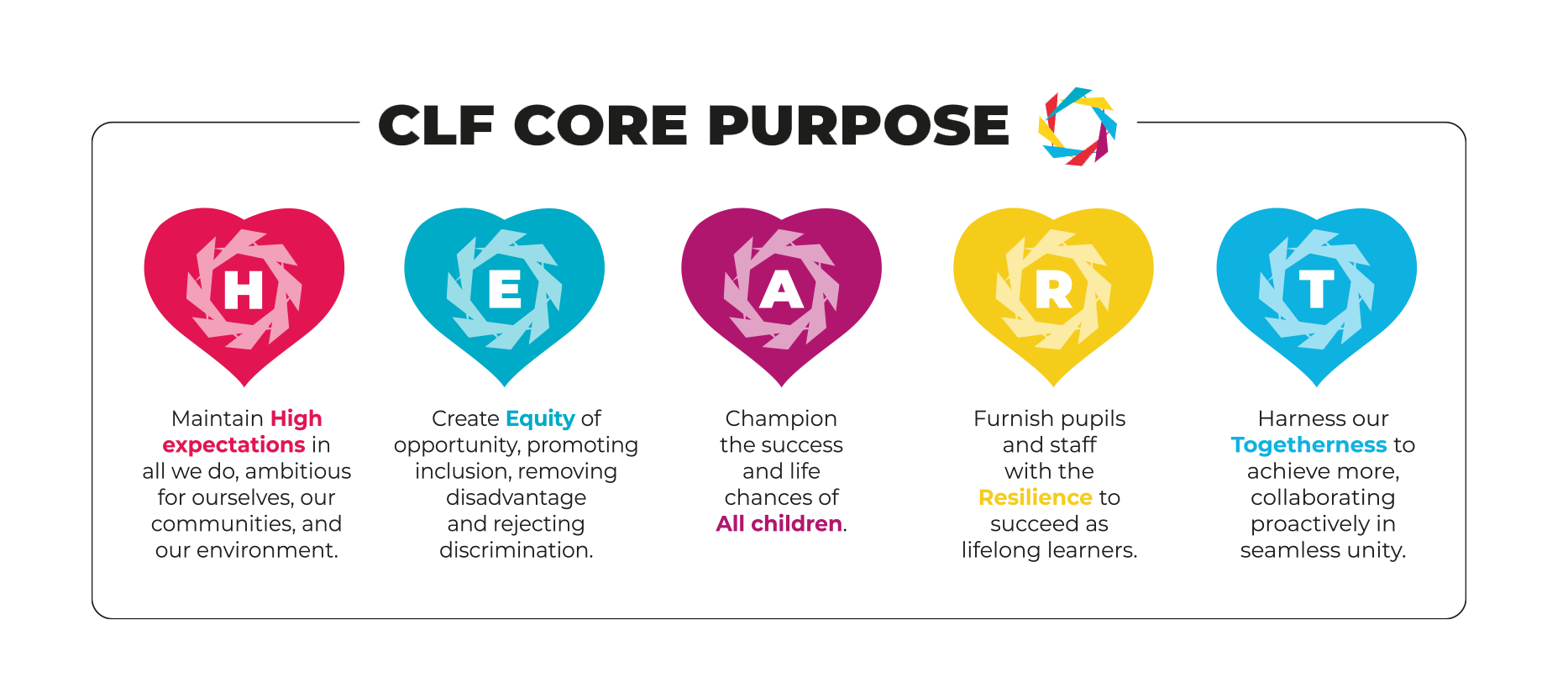
All behaviour is a form of communication. Where a child is unable to express their feelings and thoughts in ways that can be understood and respected while keeping themselves and others safe the first thing, we need to ask ourselves is, what are they trying to communicate? We need to follow by supporting the child to make the right choices. Lime Hills Academy takes a trauma informed approach when dealing with behaviour. We have high expectations for our children and believe in safety through routines, boundaries and positive relationships.
Students attending Lime Hills Academy have often experienced difficulties in meeting the demands of mainstream education. They have experienced many consequences and often rejection. Within the structured and consistent educational setting at our school, we concentrate on recognising and rewarding positive behaviour as a central part of our way or working.
Acceptable behaviour is a way of life and therefore extends beyond lessons and the school boundaries. This includes behaviours around arriving at and leaving Lime Hills Academy, being offsite on trips and outdoor learning and behaving appropriately in all interactions with the local community and employers.
SEMH School understands the inherent challenges of its SEMH status and recognises that students’ attitudes and behaviour may be linked to home circumstances and contexts, diagnosed or undiagnosed medical conditions or learning difficulties and to the quality of relationships promoted by school staff. The quality of these relationships is vital to create a culture of positive well-being and self- regulation.
We do not measure positive behaviour merely by compliance. Students in the school are often caught in negative cycles of reactive behaviour. It is important for students to find an authentic voice of their own and to feel they can express themselves with confidence and honesty. The role of the school is to promote appropriateness and empower students to develop independence, emotional maturity and to take responsibility for developing positive cycles of behaviour.
Internal and external specialists will work with students with persistent inappropriate behaviour or where a student has an underlying identified condition that demonstrates itself through inappropriate behaviour and identify strategies to address this with the student and subject teachers.
Lime Hills Academy will create an environment, a workforce and a curriculum experience which enables children and young people with social, emotional, and mental health difficulties to develop the skills, resilience, and self-awareness to be successful in later life.
Combining a knowledge of research in neuroplasticity with utilisation the natural physical environment, creative and therapeutic opportunities, children at Lime Hills Academy will be supported to develop self-regulation and a broader window of tolerance in their daily life so that they can access the very best academic opportunities at their point of readiness.
Each child will have a different range of needs and hence a different range of opportunities and therapies, and the curriculum will be designed around an understanding of the individual: no two curricula will look the same. The design of the school day and staffing structure will support children to access learning through being more regularly in optimum arousal stage: this will be enabled by ensuring children are attached or allocated to three key staff, helping them to build relationships over time and enabling them to feel safe and thrive, even in the face of change. The small number of people working with each individual enables optimal arousal to be learning without the vulnerability associated with ensuring trusted connections with only one adult.
The setting will have a range of carefully designed spaces which will enable group interaction, safe spaces for retreat, those which facilitate academic learning and those which are more therapeutic in nature. The day will involve routine and structure which creates a feeling of safety, without the rigidity of a mainstream setting: staff will be trained and empowered to deviate from routine where appropriate to help an individual to make progress socially, emotionally or academically whilst maintaining the very highest expectations.
A positive and holistic discipline approach of recognition and individualised student led consequences will ensure that all children are supported to comply with clear expectations as part of their behaviour development.
Key workers will provide support and guidance with individual behaviour targets which move children through stages of mastery in terms of appropriate and positive behaviour. There will be high expectations for all. It is also likely to be the case that there may be more effective ways that we will have become aware of by the time of opening or in the first year
With recognition that all behaviour is communication, Lime Hills Academy works with the pupils to help them to express their feelings and thoughts in ways that can be understood and respected while keeping themselves and others safe.
The foundation on which the curriculum for children with SEMH is built will be based on the belief that social and emotional learning comes first because learning is an uncomfortable state within which a child must take risks. If a child is unable to regulate their own emotions, they are unable to navigate the learning journey. Because of this, the daily experience will be structured to enable emotional and social need to be met from the point where children are collected from their homes. This will allow optimal preparation for learning via the journey to school, the settling period in school before accessing the curriculum, where they will be able to make accelerated progress because the social and emotional barriers to this will have been moderated or overcome.
For all children, behaviour, communication interventions are a key part of the curriculum to support students and give them the language to be able to function safely and productively in society both during their younger years and into adulthood.
Relationships and belonging are essential for building trust and regulation, staff regularly talk to parents, have detailed student passports through transition and beyond and use the 5 Point scale to help students re-regulate.
Students will be various stages in the development of their social, emotional and communication development. For example:
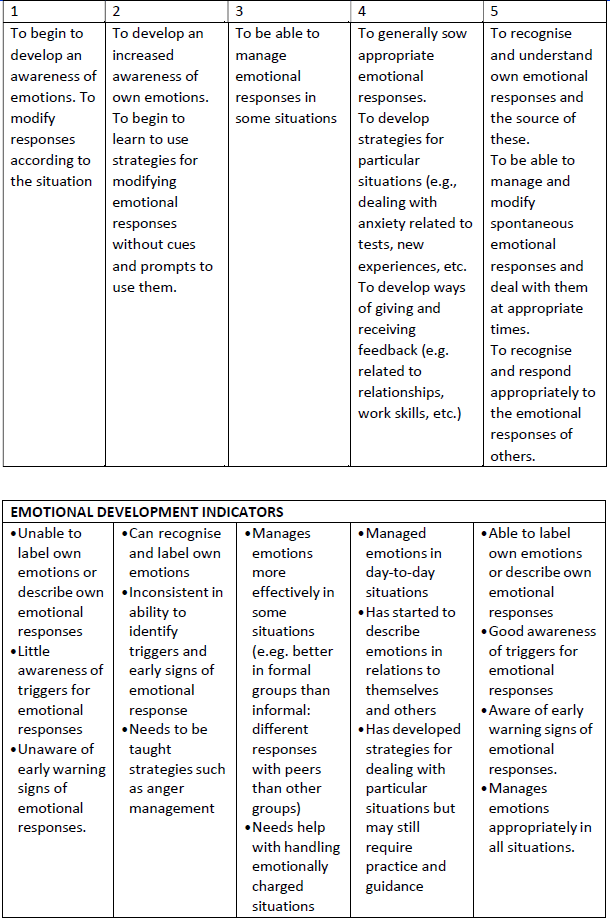
Give students responsibility for their behaviour:
The Principal, Deputy Principal/ SENCO, Deputy Principal Primary, Pastoral Lead, and the Governing Body are responsible for the consistent and fair operation of this Policy.
In implementing this Policy, staff will be responsible for:
In support of the Policy, parents/carers will be encouraged to:
In support of the Policy, students will be encouraged to:
Lime Hills Academy operates a system of individualised recognition and consequences which is closely monitored to ensure that arrangements have due regard to equal opportunities and anti- discrimination.
It is also extremely important for the Academy to promote an ethos of recognition and celebration rather than sanction and punishment. Staff are supported to avoid following reactionary cycles that may have previously failed students in our setting. While students are expected to take responsibility for their actions, staff must be aware of their own responsibility to act with well-considered professional judgement.
Training and development will be provided to emphasise the importance of a shared understanding of how ALL staff are behaviour managers and positive role models.
On a day-to-day basis the Senior Leadership Team will support staff to promote productive learning behaviours in the learning environment.
Student progress is monitored by the Senior Leadership Team, teachers and named key adults. Learning Goals achieved and attendance data will indicate a positive response to learning and should be identified and recognised whenever possible.
It is important that students are recognised when behaving and achieving well. Consistency and high expectations are paramount. In addition to the above, the following will be used as positive responses by ALL staff:
Lime Hills Academy is an SEMH Provision School. The students at Lime Hills Academy are likely to have encountered negative cycles of consequences. In our context, consequences are only effective if used very rarely, proportionately, and consistently. Confrontation is never a way to solve a problem in our setting.
Everyone in the staff team is expected to address these types of issues in the first instance:
Staff should make every effort to solve any day-to-day dysregulation and challenging behaviours as they arise.
In an SEMH school context dysregulation and challenging behaviours are likely to occur frequently. In certain circumstances, support may be required when this is significantly defiant and counterproductive, and another students learning is impeded. Staff should not hesitate to ask for guidance and assistance from colleagues if they feel it will improve student well- being and/or behaviour. An informal referral of this nature is generally a much more positive action than a formal approach.
The safety of students and staff is of paramount importance to the well-being of the Lime Hills Academy. Staff should take care not to put themselves in a position of physical danger. Physical intervention training (Team Teach) and support is made available to all staff.
Students whose conduct falls below the standard which could reasonably be expected of them, can expect that appropriate action be taken. Where possible students are involved in Working out how they can fix the problem through natural consequences.
In some cases staff will enforce a sanction being clear with the student why this is appropriate.
To be lawful, any disciplinary measures must be proportionate and satisfy the following conditions:
When poor behaviour is identified, consequences should be implemented consistently and fairly, and be in line with the behaviour management policy. Staff work with students to identify consequences that go some way to put the incident right e.g. helping to repair a broken door, writing a letter to a member of staff, having a repair conversation. Other consequences that students and staff may include:
Every child is discussed regularly through wrap ups, line management, CPOMS logs and SLT meetings, additional interventions and strategies put in place.
In more extreme cases the school may use fixed term suspension or permanent exclusion.
All students have an absolute right to be educated in a safe and secure environment and to be protected from others who may wish to harm, degrade, or abuse them.
There is no justification whatsoever for bullying behaviour and it should not be tolerated in any form. Differences including race, religion, gender, sexual orientation, and ability are absolutely repudiated as reasons for bullying.
Bullying behaviour is a problem from both the victim and the bully and should be addressed in positive and constructive ways which provide opportunities for growth and development for the individuals involved.
Effective management of bullying is a shared responsibility, and strategies should involve school staff and students, parents/carers, and other professionals.
It is important to invest time and resources in the prevention and management of bullying. Staff and students require advice, training, and support to manage it with confidence.
Please see the Anti Bulling Policy for more information.
Our guiding principle is that all attempts will be made to avoid external suspension/suspension from school. However, we have a responsibility to safeguard all students in the school.
Concerning behaviour that may warrant a fixed term suspension is logged on CPOMS, with a letter sent home and work provided (if we have to make this difficult decision as a last resort). Where possible the student’s key adult will work with the student off site or virtually.
Only the Principal can authorise a suspension. SLT will need the following information:
Fixed Term Suspensions during school day will only be made if students have put themselves and the rest of the school community at risk or are beyond the school’s care and control.
SLT need to have all relevant information prior to make any decision on exclusion.
When students fail to follow the school rules, they put themselves beyond our care and control. If they do this persistently, they may face a permanent suspension from Lime Hills Academy
In certain circumstances the school may decide that it is safer for the student not to be sent home and to be ‘Internally suspended’ instead. If this is the case this will be communicated to parents/carers and learning will take place in a 1:1 room.
Persistent disruptive behaviour can have a major negative impact on the learning environment.
It is important that this is tackled quickly and effectively. Often, verbal reminders of expectation, classroom re-organisation or diversionary strategies will prove effective. The following points are all considered important and should be remembered by both teaching and non-teaching staff:
In line with government guidance, we do not allow mobile phones and devices to be used on site during the school day.
Mobile phones distract students from learning and being ‘present’ at school.
This also protects against online bulling in school and reactive online behaviours to messages and social media from other members of the school community and beyond.
Students hand in mobile phones in reception (secondary) and to their teachers on the gate (primary)
Students will be offered support in relation to their drug/alcohol misuse through Personal tutorial sessions and close collaborative work with Healthcare professionals and other outside agencies such as Local Authority Drugs Project as well as our well-being team.
If they disappear from sight, immediately inform the Office Staff and DSLO. They will notify the relevant parties, including the police, when they have determined that the child is not in the immediate vicinity or returned to site.
Please note:
Potentially, this is the most serious scenario. In this event, if a young person(s) has disappeared from view, make a note of the time and general direction.
The academy reserves the right to search students for items that are banned by the academy rules. This includes bags. If a student refuses to be searched then permission will be sought from parents or in extreme cases, the Police will be contacted.
The academy can search students without consent for knives, weapons, alcohol, illegal drugs, and stolen items. A search with a security handheld wand can be undertaken if the school has reasonable grounds for suspecting that a student is in possession of a prohibited item. Items found will be retained by academy staff and may be handed to the Police where necessary.
During a search, students will not be instructed to remove garments that are not outer garments. For clarity outer garments means clothing that is not worn next to the skin but does include, hats, shoes, boots, gloves and scarves, coats and other additional jumpers, sports jackets and sweatshirts.
Section 91 of the Education and Inspections Act 2006, enables academy staff to confiscate, retain or dispose of a student’s property, where reasonable to do so. Academies are not required to inform parents before a search takes place or to seek consent to search their child.
Members of staff have the power to use reasonable force to prevent students committing an offence, injuring themselves or others (including self-defense), or damaging property, and to maintain good order and discipline throughout the school.
All incidences involving Restricted Physical Intervention must:
In some of the circumstances outlined above, especially where anger and aggression have been shown, then it is just as stressful for the staff involved as the pupils themselves.
Therefore, it is important that we ensure the staff involved have the opportunity to take time away from the teaching environment to calm themselves and discuss the incident with a supportive colleague.
The member of staff involved, and any witnesses, must have the opportunity to write up a report of the incident as soon as possible. This may need the intervention of other colleagues and members of the Senior Leadership Team in either supporting the member of staff affected by the incident and/or their teaching commitments.
Opportunities at a later stage to have a debrief regarding the incident a member of the senior leadership team should be made available. In some cases, this could include external supervision or engagement with our Employee Assist Services. As a SEMH School we value regular supervision for staff; following a big incident/ emergency, supervision sessions will be commissioned professional services such as NAOS.
If there has been a period of sustained and increased level of negative behaviour over a significant period of time this will be discussed in SLT meetings and a plan put in place.
The following will be logged on CPOMS:
In the most extreme circumstances, the recommendation at this level could be Permanent Exclusion. This decision would be made by the Principal in consultation and agreement with the Board of Governors.
Only the Principal may take the decision to exclude a student. In taking the decision to exclude a student, the Principal will take into consideration mitigating factors and aggravating factors.
Mitigating factors may include provocation as a result of bullying, the student's emotional and/or medical condition, potential coercion by other students, and the nature of the offence and whether it is a first offence, previous behaviour, an apology, an admission, willingness to cooperate with the investigation and a willingness to make restitution towards the victim.
Aggravating factors may include failing to heed warnings about the risk of exclusion, premeditation of the offence, use of a weapon, previous history of similar incidents, witness intimidation, the victim(s) sustaining injury, the victim being a younger or vulnerable student, lack of contrition or willingness to accept responsibility for his/her action and not cooperating with the investigation or seeking to frustrate it.
When the decision to exclude a student has been made a parent/carer will be notified immediately by telephone and this will be confirmed in writing.
The Governing Body will review all exclusions and consider any representations made to them by parents.
On receiving notification from the Principal, a representative from the Governing Body will invite the parents/carers to attend the meeting. It will request written statements and will circulate these at least five days in advance of the meeting. The Governing Body may uphold the suspension or direct the student's reinstatement.
Parents/carers have a right to appeal any suspension decisions. As an alternative provider of education, the Academy has a commitment to ensure that all students are progressed in a way to meet their needs. This will remain the objective in cases of exclusions so the Academy will work in partnership with parents/carers to ensure appropriate progression routes are established.
In cases where this is not accepted, an independent appeals panel may be convened. The governors will consult with the relevant Local Authority in these cases.
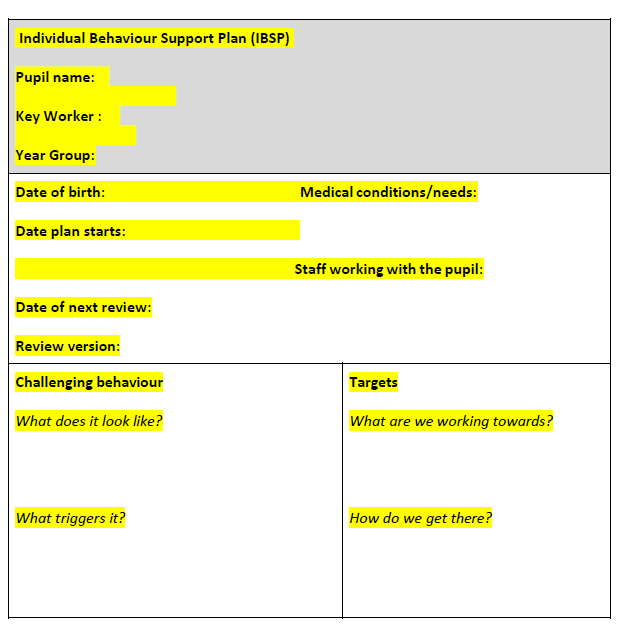
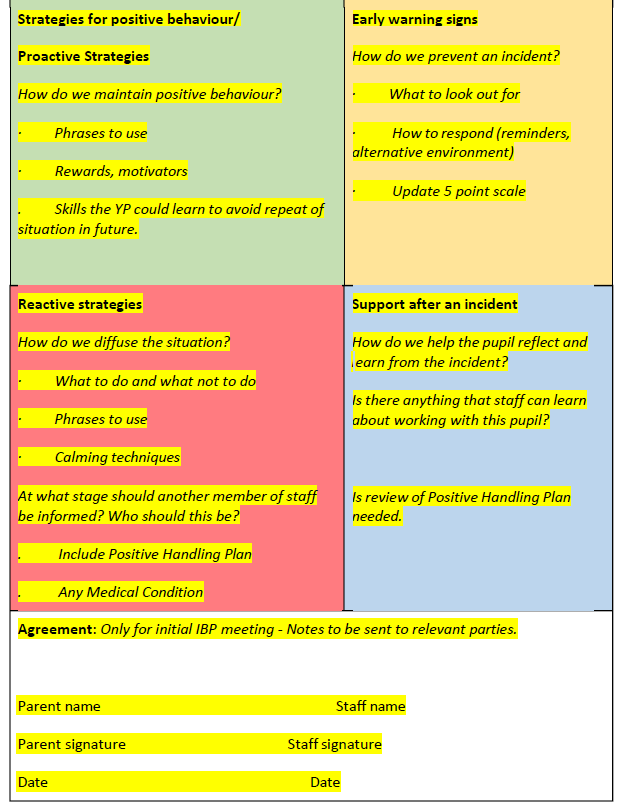
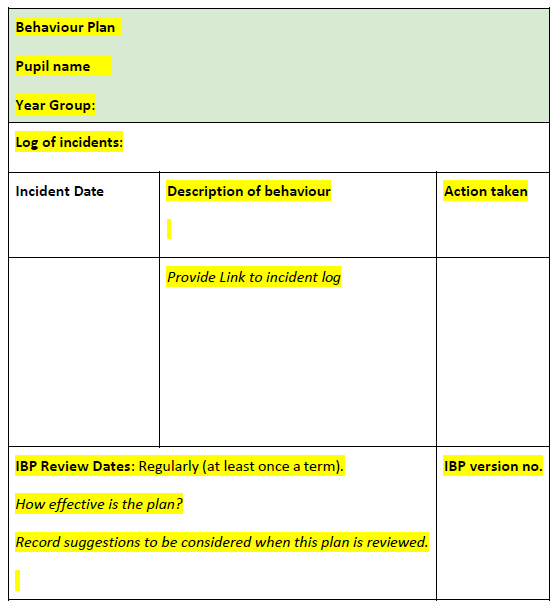
Acceptable standards of behaviour, work and respect depends on the collective example we set. Relationships are vital between everyone and at every level and are key to this process. Staff must take the initiative and apply the following:
Students may be inclined to test the school’s boundaries of acceptable behaviour. Our behaviour management success is tested not by the absence of problems but by the way in which they are handled.
It helps by:
All informal contact contributes to standards of behaviour. Staff must take the initiative to monitor and control behaviour at every opportunity and take responsibility to:
When presented with particularly challenging students and situations, staff must remain calm and professional and be sure to avoid the following:
It often helps to do all you can do to:
Above all:
